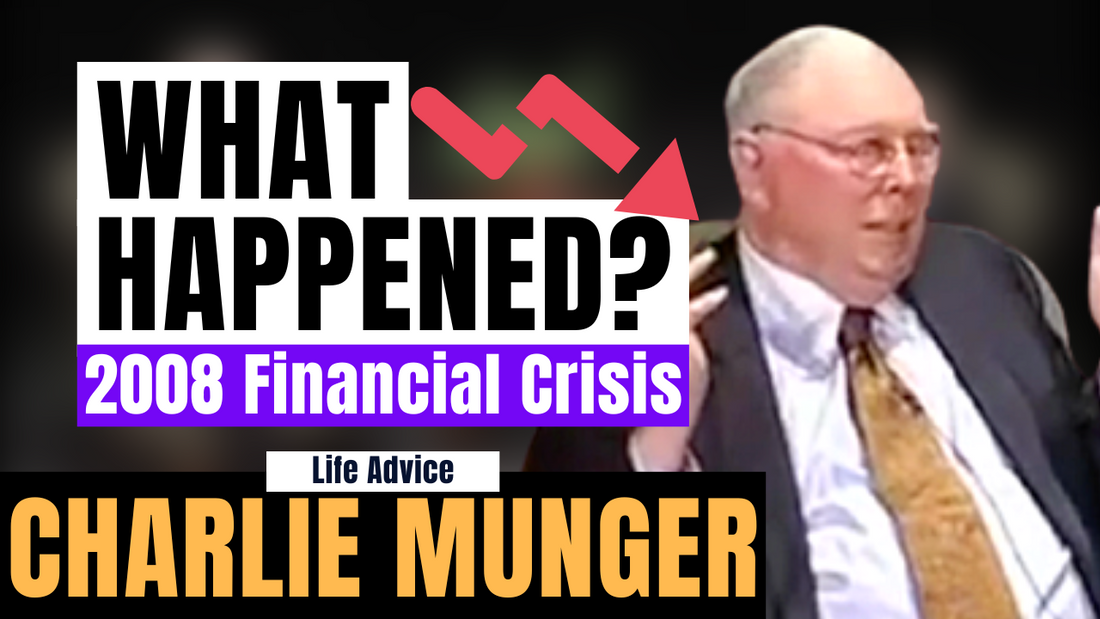
Charlie Munger Explains the 2008 Financial Crisis | Caltech 2008【C:C.M Ep.237】
[Transcript]
TOM TOMBRELLO: 20 years ago, I decided I wanted to – my wife and I decided to build a house on the tropical island and yet it had hurricanes.
And you know being a Caltech professor, that's a risk I didn't want, so I constructed a financial instrument which was build a house and buy an insurance policy. Hurricane did come, damage the house severely.
And now more out of blind dumb luck than skill, I cashed the check from the insurance company about two weeks before the insurance company went belly-up, because the insurance company had only insured houses on this island. (Laughter)
And therefore – (Laughter) – I hadn't constructed a hedge at all.
CHARLIE MUNGER: No, of course not.
TOM TOMBRELLO: I had constructed a common mode failure.
And so the real question in society right now, when we talk about bundled mortgages or any of the other finance – hedge funds – is whether the risks are really independent and you can determine them or whether somehow there's these common mode failures that take down those systems at once?
CHARLIE MUNGER: The same people – we're trying to ruin the social scientists by taking it into this stream hopeless complexity of math that won't work – are alive and well on Wall Street and creating securities, etc.
And they've done the same thing there. They have created things so complicated that nobody can understand them. And therefore, they take shortcuts. They don't try. They rely on the rating agencies.
There are grown men who looked at a bunch of collateralized debt obligations, all of which was rated Triple-A by rating agencies, and they all yielded 60 basis points (0.60%) more than normal Triple-A pieces of paper.
Well, anybody with a grain of sense would see danger flags flying – I mean, the hurricane concept would come quickly to your mind. But what these people saw was a marvelous opportunity to get a lot of money for themselves by lying and cheating.
They bought all these Triple As, they leverage four or five times over and then they told their investors they were getting alpha. They weren't getting alpha. They were taking a hurricane risk and telling the people they deserved extra pay because they were delivering alpha. Well, they were delivering extra profits as long as there was no hurricane – no financial heavy wind.
This is a deeply immoral way to create financial instruments, it's a deeply immoral way to run an investment operation and of course, it's attracted more and more people from eminent places like MIT. (Laughter)
People go into this derivative trading, you know because it's hard to rise in standard oil and inventing better oil refineries, it takes time and there's competition and so on. Besides when you're all done, nobody's ever going to hand you a 180 million dollars.
And so these people do go into this activity and they create this hopeless massive super complexity, then they get trading systems which their accountants bless and they punch these buttons.
And if they've agreed to buy something eight years in the future from A for a 100 million and sell it eight years in the future to B for 105 million, they punch the button and both obligations disappear, and it shows the 5 million dollar profit receivable from the second guy.
Well, just because you can punch a button on a computer and show a 5 million dollar profit, doesn't mean you have a 5 million dollar profit. What you have is a disastrous closing risk at the market, if the market goes horribly against you.
Is the guy who's lost heavily – the 100 million dollar bet – is going to be like the hurricane insurer on my friend's island? And the answer is yes, in many cases, he's going to be like the hurricane insurer on the island.
We're just seeing that stuff unfold and you can't watch it unfold without feeling the way I feel about a lot of liberal art professors. (Laughter) The people who did this are despicable. The accountants that bless the accounting have despicably failed in their own profession.
If I make loans for many years, nice little 75% mortgage loans on decent houses to hard-working plumbers, and I have a wonderful low bad debt risk. And then I suddenly decide I want to report a lot of extra income.
So I have somebody recruit a bunch of bums from skid row and you know, charlatans just out of the penitentiary. And I have them agree to pay these very high interest rates on 100% loans and so forth.
And I say to my accountants, "Accrue all this interest these people have agreed to me as income, they haven't agreed to pay to me yet, but in due course, it's due. And the way you'll do that is just assume that my bad debt experience on this new class of loans will be like the ones I formerly made."
Well as I've described, but nobody in his right mind would have an accounting that accrued the interest on the new loan. But in America, the accountants blessed that stuff. And they would say you would make my life too difficult if I had to do anything but look back and count the old bad debt experience and just extrapolated into the new type of loans.
This is not a modest fault. This is a significant fault in our common civilization, the professionals have horribly failed us and the academics that have allowed these professionals to prosper without appropriate criticism, they have failed us too.
And the regulators were inside of the example, 200 regulators in Washington, they have two companies in Washington and their sole job is to watch these two companies for an unendurable future troubles; Fannie Mae and Freddie Mac.
200 people and all failed. That's all they have to do. They ended up with – I don't know – 30 billion dollars worth of miscalculated earnings, and it just was totally insane. It was a Mad Hatter's tea party.
All these people have horribly failed us with the most elementary common sense. Nobody ever said, "Look, this is too difficult, at least for the kind of people you have doing it." (Laughter)
And it was obvious, it was too difficult for the kind of people. And the guy who headed Freddie Mac was a PhD economist.
And Berkshire has a subsidiary and it was headed by a PHD psychologist, and the only thing he improved in his tenure was the wine cellar, the corporate wine cellar. (Laughter) And when the money finally ran short and this chief financial officer said, "We're running short of money for the wine cellar." He said, "Take it out of the depreciation reserves."
The depreciation reserves are a liability account. PhD in psychology...
I mean I don't invent these stories, one of the beauty – (Laughter) – If you're a collector of inanity, you can top anybody always with a true story. (Laughter)
(Source: https://youtu.be/4ibabROYccs?si=AGQznfOPmt9tv3yg)
[YAPSS Takeaway]
Don't be fooled by 'label.'
